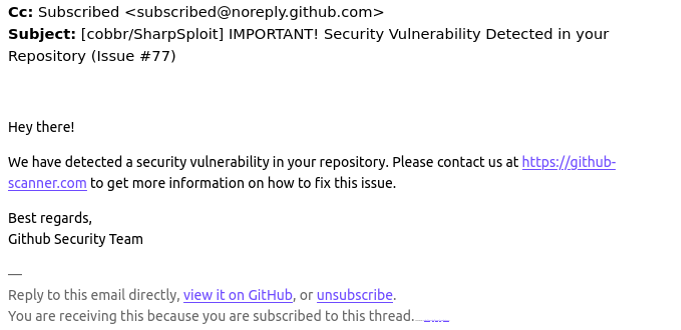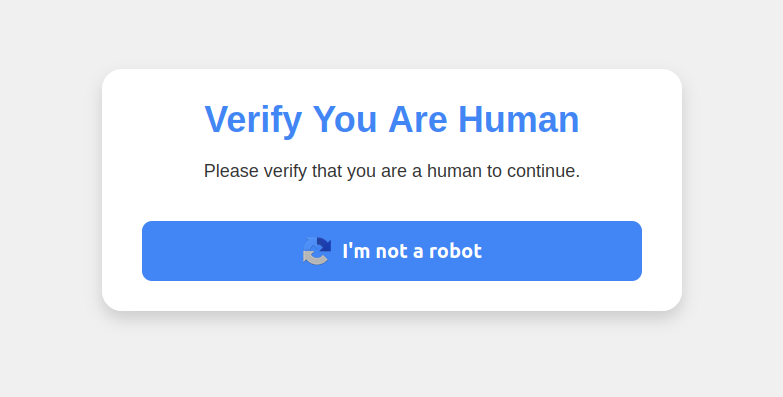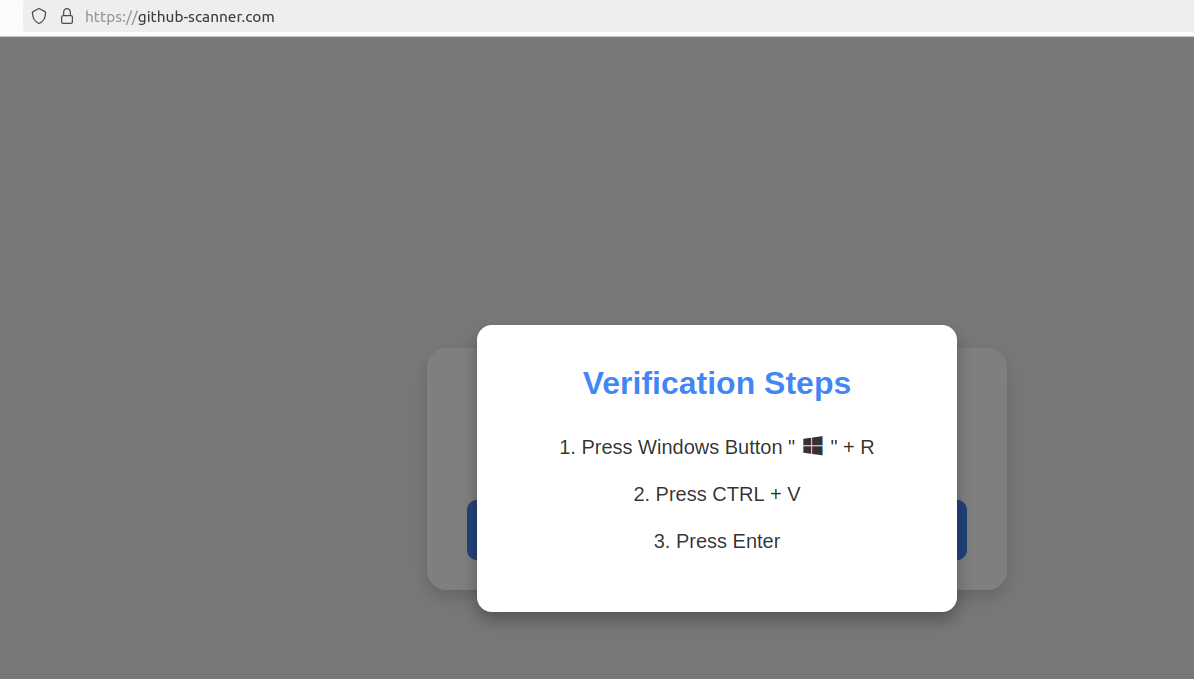Many GitHub users this week received a novel phishing email warning of critical security holes in their code. Those who clicked the link for details were asked to distinguish themselves from bots by pressing a combination of keyboard keys that causes Microsoft Windows to download password-stealing malware. While it’s unlikely that many programmers fell for this scam, it’s notable because less targeted versions of it are likely to be far more successful against the average Windows user.
A reader named Chris shared an email he received this week that spoofed GitHub’s security team and warned: “Hey there! We have detected a security vulnerability in your repository. Please contact us at https://github-scanner[.]com to get more information on how to fix this issue.”

Visiting that link generates a web page that asks the visitor to “Verify You Are Human” by solving an unusual CAPTCHA.

This malware attack pretends to be a CAPTCHA intended to separate humans from bots.
Clicking the “I’m not a robot” button generates a pop-up message asking the user to take three sequential steps to prove their humanity. Step 1 involves simultaneously pressing the keyboard key with the Windows icon and the letter “R,” which opens a Windows “Run” prompt that will execute any specified program that is already installed on the system.

Executing this series of keypresses prompts the built-in Windows Powershell to download password-stealing malware.
Step 2 asks the user to press the “CTRL” key and the letter “V” at the same time, which pastes malicious code from the site’s virtual clipboard.
Step 3 — pressing the “Enter” key — causes Windows to launch a PowerShell command, and then fetch and execute a malicious file from github-scanner[.]com called “l6e.exe.”
PowerShell is a powerful, cross-platform automation tool built into Windows that is designed to make it simpler for administrators to automate tasks on a PC or across multiple computers on the same network.
According to an analysis at the malware scanning service Virustotal.com, the malicious file downloaded by the pasted text is called Lumma Stealer, and it’s designed to snarf any credentials stored on the victim’s PC.
This phishing campaign may not have fooled many programmers, who no doubt natively understand that pressing the Windows and “R” keys will open up a “Run” prompt, or that Ctrl-V will dump the contents of the clipboard.
But I bet the same approach would work just fine to trick some of my less tech-savvy friends and relatives into running malware on their PCs. I’d also bet none of these people have ever heard of PowerShell, let alone had occasion to intentionally launch a PowerShell terminal.
Given those realities, it would be nice if there were a simple way to disable or at least heavily restrict PowerShell for normal end users for whom it could become more of a liability.
However, Microsoft strongly advises against nixing PowerShell because some core system processes and tasks may not function properly without it. What’s more, doing so requires tinkering with sensitive settings in the Windows registry, which can be a dicey undertaking even for the learned.
Still, it wouldn’t hurt to share this article with the Windows users in your life who fit the less-savvy profile. Because this particular scam has a great deal of room for growth and creativity.
VTScanner is a versatile Python tool that empowers users to perform comprehensive file scans within a selected directory for malware detection and analysis. It seamlessly integrates with the VirusTotal API to deliver extensive insights into the safety of your files. VTScanner is compatible with Windows, macOS, and Linux, making it a valuable asset for security-conscious individuals and professionals alike.
VTScanner enables users to choose a specific directory for scanning. By doing so, you can assess all the files within that directory for potential malware threats.
Upon completing a scan, VTScanner generates detailed reports summarizing the results. These reports provide essential information about the scanned files, including their hash, file type, and detection status.
VTScanner leverages file hashes for efficient malware detection. By comparing the hash of each file to known malware signatures, it can quickly identify potential threats.
VTScanner interacts seamlessly with the VirusTotal API. If a file has not been scanned on VirusTotal previously, VTScanner automatically submits its hash for analysis. It then waits for the response, allowing you to access comprehensive VirusTotal reports.
For users with free VirusTotal accounts, VTScanner offers a time delay feature. This function introduces a specified delay (recommended between 20-25 seconds) between each scan request, ensuring compliance with VirusTotal's rate limits.
If you have a premium VirusTotal API account, VTScanner provides the option for concurrent scanning. This feature allows you to optimize scanning speed, making it an ideal choice for more extensive file collections.
VTScanner goes the extra mile by enabling users to explore VirusTotal's detailed reports for any file with a simple double-click. This feature offers valuable insights into file detections and behavior.
For added convenience, VTScanner comes with preinstalled Windows binaries compiled using PyInstaller. These binaries are detected by 10 antivirus scanners.
If you prefer to generate your own binaries or use VTScanner on non-Windows platforms, you can easily create custom binaries with PyInstaller.
Before installing VTScanner, make sure you have the following prerequisites in place:
pip install -r requirements.txtYou can acquire VTScanner by cloning the GitHub repository to your local machine:
git clone https://github.com/samhaxr/VTScanner.git
To initiate VTScanner, follow these steps:
cd VTScanner
python3 VTScanner.py
VTScanner is released under the GPL License. Refer to the LICENSE file for full licensing details.
VTScanner is a tool designed to enhance security by identifying potential malware threats. However, it's crucial to remember that no tool provides foolproof protection. Always exercise caution and employ additional security measures when handling files that may contain malicious content. For inquiries, issues, or feedback, please don't hesitate to open an issue on our GitHub repository. Thank you for choosing VTScanner v1.0.